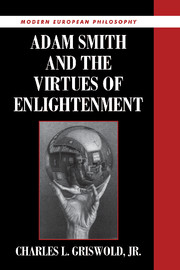Book contents
- Frontmatter
- Contents
- Texts and Acknowledgments
- Introduction
- 1 Rhetoric, Method, and System in The Theory of Moral Sentiments
- 2 Sympathy and Selfishness, Imagination and Self
- 3 The Passions, Pleasure, and the Impartial Spectator
- 4 Philosophy and Skepticism
- 5 The Theory of Virtue
- 6 Justice
- 7 The Moral Sentiments and The Wealth of Nations
- 8 Philosophy, Imagination, and the Fragility of Beauty: On Reconciliation with Nature
- Epilogue
- Bibliography
- Index
7 - The Moral Sentiments and The Wealth of Nations
Published online by Cambridge University Press: 10 November 2009
- Frontmatter
- Contents
- Texts and Acknowledgments
- Introduction
- 1 Rhetoric, Method, and System in The Theory of Moral Sentiments
- 2 Sympathy and Selfishness, Imagination and Self
- 3 The Passions, Pleasure, and the Impartial Spectator
- 4 Philosophy and Skepticism
- 5 The Theory of Virtue
- 6 Justice
- 7 The Moral Sentiments and The Wealth of Nations
- 8 Philosophy, Imagination, and the Fragility of Beauty: On Reconciliation with Nature
- Epilogue
- Bibliography
- Index
Summary
The ancient politicians forever spoke of morals and of virtue; ours speak only of commerce and of money.
Jean-Jacques RousseauAn Inquiry into the Nature and Causes of the Wealth of Nations has among its chief aims to promote the just and effective pursuit of wealth. Smith's book is undoubtedly the most famous and enduring Enlightenment contribution to the subject. The Enlightenment, in turn, is closely tied to the liberation of the desire for wealth, and so to commerce and the free market which are, Smith persuasively argues, the most effective means to the satisfaction of that desire. This is no sooner said than ethical controversy surrounds the entire project. Is not the pursuit of wealth, especially when organized on a mass scale and sanctioned by law and custom, profoundly corrosive of virtue, good character, and community? Does not the creation of wealth require the exploitation of the workers, indeed their spiritual impoverishment, as they toil in the production lines for depressed wages while the rich reap profits from their stupefying labor? Consider too the vulgarity of the “consumerist” cultures of societies that have succeeded, thanks to the very sorts of social and economic mechanisms advocated by Smith, in becoming wealthy. The various liberties these societies enjoy, such as liberties of speech and religious belief, themselves slip (some would say) ineluctably and predictably into chatter and religion-of-your-choice sentimentality.
- Type
- Chapter
- Information
- Adam Smith and the Virtues of Enlightenment , pp. 259 - 310Publisher: Cambridge University PressPrint publication year: 1998



